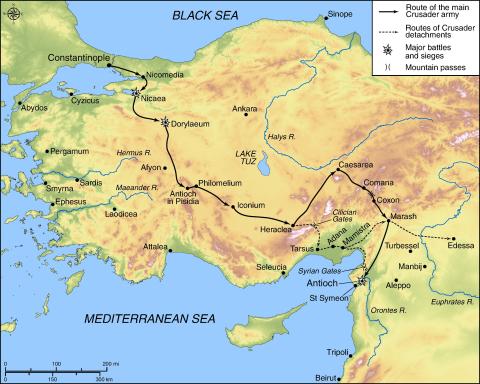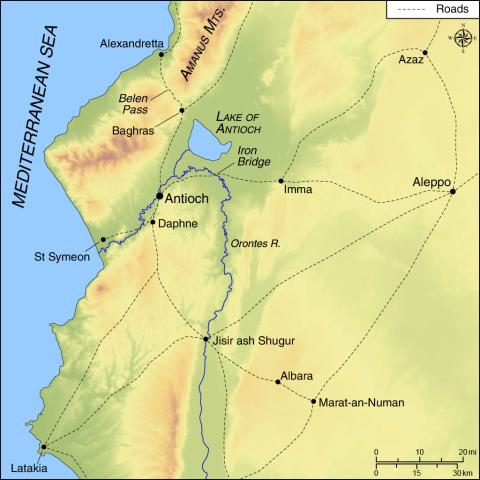The Road to Antioch
[4.11.5] Vēnērunt itaque in vallem prope Antiochīam ad quoddam castrum Pūblicānōrum, illīcque audiērunt Turcōs esse in cīvitātem eamque fortiter dēfendere praeparābant. Petrus dē Roasā dīvīsit sē ibi ab aliīs, et proximā nocte trānsīvit prope Antiochīam, intrāvitque vallem dē Rugīā; et invēnit Turcōs et Saracēnōs, et proeliātus est cum eīs, et occīdit multōs ex eīs, et aliōs persecūtus est valdē. Videntēs hōc Armēniī, habitātōrēs terrae illīus, illum fortiter superāsse pāgānōs, continuō reddidērunt sē. Ipse vērō statim cēpit Rūsam cīvitātem, et plūrima castra.
[4.11.6] Nōs autem quī remānsimus, exeuntēs inde, intrāvimus in diabolicam montānam, quae tam erat alta et angusta ut nūllus nostrōrum audēret per sēmitam, quae in monte patēbat, ante alium praeīre. Illīc praecipitābant sē equī, et ūnus saumārius praecipitābat alium. Mīlitēs ergō stābant undique trīstēs, feriēbant sē manibus prae nimiā trīstitiā et dolōre, dubitantēs quid facerent dē sēmetipsīs et dē suīs armīs, vēndentēs suōs clipeōs et lōrīcās optimās cum galeīs, sōlummodo propter trēs aut quīnque dēnāriōs, vel prout quisque poterat habēre. Quī autem vēndere nequībant, gratis ā sē iactābant, et ībant.
notes
vocabulary
4.11.6
sēmita –ae, f.: path, track
saumarius –iī, m.: beast of burden (ML)
praecipitō (1): to cause to fall headlong
feriō ferīre: to strike, beat
clipeus –ī, m.: shield
lōrīca –ae, f.: corselet, cuirass
galea –ae, f.: helmet
gratis: for no reward, without payment (see OLD grātia 8)


